At a conference in Prague this past spring (May 2023), a prominent theorist of colonialism and coloniality spoke to us via video chat from his office in the Americas. He was asked what he thought about the claim that Russia’s relationship to Ukraine is colonial. I was looking forward to hearing how he applied his usual subtlety and insight to the situation in Eastern Europe, but as seems to have happened often to people observing this war, neither subtlety nor great insight was on display. He simply responded that, because Russia’s relations with Ukraine are so absolutely different from the Western powers’ treatment of the Americas and Africa, the term “colonialism” is completely inapplicable. And apparently, in his view, if the relationship was not colonial, there was no need to bother ourselves with details. Accordingly, Russia’s invasion was a normal response of one imperial power to the domineering actions of another, and it wasn’t the business of anti-colonial theorists to take sides. As if, wherever postcolonial frameworks don’t apply, we had no alternative but the realist school of Great Power international relations.
I’ve avoided naming this scholar out of respect for his careful theoretical work, which should not be obscured by the analytic inadequacies of a single, hasty (though very long-winded and self-assured) comment. But his response illustrates a deeper failing – or rather, a series of mutually reinforcing failures – in recent attempts to understand international and intercultural domination in Eastern Europe[1]. Both in academic work and, more importantly, in public discourse, discussion of domination in Eastern Europe has been divided into two opposing camps, neither of which adequately captures the specificity of the situation.
In one camp we see efforts to apply colonial and post-colonial concepts in the region, often without nuance or attention to regional specificities. In the discourse of those who condemn Russian power as colonial, the vast differences between Russian power in Eastern Europe and Western power in the Global South are often written off as unimportant, secondary to the rhetorical imperative of condemning Russian domination. It is rarely asked whether subject populations might confront different forms of domination (colonial or imperial, East or West or South) with different strategies of resistance.
Then, in an opposing camp, we have responses that reject this simplistic use of concepts. But instead of devising better concepts, they ignore the whole problem–that there might exist other significant forms of domination than Western colonialism. If Russia is not colonial the same way Spain or England was, then it is of little concern to orthodox critics of colonialism. If Russia is not colonial, but merely imperial, then from this perspective the next logical step is to begin comparing empires, considering how bad they all are, without getting mixed up in inter-imperial conflicts. If Ukraine is not a colonized territory in the familiar sense, then the perspectives of its government and its people appear unimportant. The traditional leftist tendency to look at politics from below gives way to the realism of those like John Mearsheimer, who show us politics from the vantage point of imperial centers like Washington and Moscow. The space between the conflicting empires goes almost unseen. Since we don’t have applicable concepts, the whole region between Russia and the West becomes virtually invisible, even while one of the largest wars of recent history is playing out within this terrain.
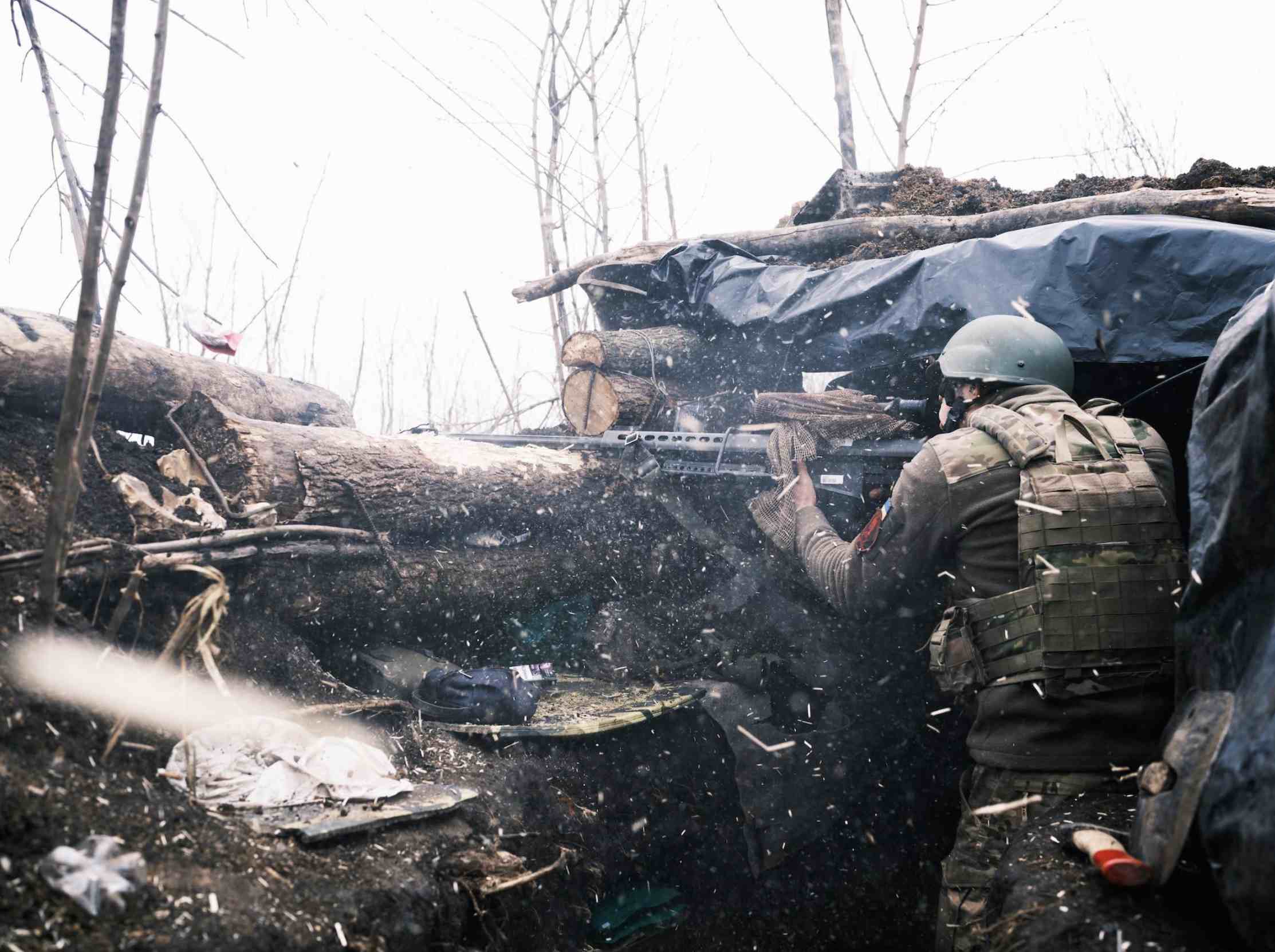
Ukrainian military. Photo: Maxim Dondyuk
Whether debates are taking place on a global scale or strictly among Eastern Europeans, it often seems as if Eastern Europe can only be seen as an entity of its own if it is identifiable within a Western epistemological framework. Either it is identifiable as a colony, the concept through which Western powers learned to identify their subordinate peripheries, or it appears only as a part of the East or the West, either as a natural part of Russia’s sphere of influence or as a natural piece of (Western) “Europe” unjustly torn away. Hence so many declarations by one camp that Ukraine had been historically mis-categorized, that it was always really a part of the West, and only became “Eastern” by mistake, in a case of mistaken identities, resulting from the confusion of colonial ideology. Hence so many declarations from the other camp that Ukraine has been historically a part of the East, the West’s other, and thus falls outside the West’s sphere of legitimate interest. One often gets the impression that being Eastern justifies being dominated and invaded, and only being Western could justify self-determination. Either the territories of Eastern Europe are colonies as the West knows them, colonies of an Eastern power, and thus not really Eastern themselves, or their trials and struggles are ignored, treated as frivolous sideshows to a global match of empires. Can we move beyond these two camps with their simplistic framework of the West, the East, and the colonies, and bring the specificity of Eastern European experience into our political epistemology?
The Fall and Ambivalent Rise of East European Anti-Colonialism
One of the ironies is that, for a long time, the question of colonialism was largely absent from East European discourse. When the rule of Communist parties in the region ended, so did the countries’ support for anti-colonial struggles. Communist parties might have denied responsibility for colonialism, but at least they recognized colonialism as a problem. And because Eastern Europe was not supposed to be a participant in colonization, it could join the struggles of the colonized. When Communist parties fell from power, the whole legacy of support for anti-colonial struggles was treated as passé, and Eastern Europe’s alleged innocence turned from a justification for solidarity to a justification for rejecting anti-colonial politics and dismissing critiques of neocolonialism. Our nation never colonized anyone, it could now be said, so colonialism isn’t our problem. Colonialism might mark an unfortunate moral failing in the otherwise admirable march of Western history, but it wasn’t something we should be expected to help fix.
Somehow, the dominant post-Communist discourse of colonial innocence was not troubled by the fact that Eastern Europe was remodeling itself in the 1990s on the very Western powers that were responsible for the worst colonial brutalities in world history, and whose contemporary prosperity derived from their histories of colonial and post-colonial extraction and exploitation. The countries of Eastern Europe were supposed to gain all the prosperity of the West, while taking on none of its guilt. But even while Eastern Europe struggled with poverty, exacerbated by the very policies dictated to it after 1989 by Western institutions and governments, the global geography of inequality suddenly became irrelevant, because Eastern Europe was supposed to become Western. Its poverty was supposed to be temporary and unrelated to the persistent structural inequalities that plagued the world system. The only problem was that Eastern European countries had been erroneously and unfairly placed on the poor side of the global divide, and it was time for them to finally assume their proper place among the rich. In the dominant discourse, it was almost never considered that entering (or “returning to”) the West might mean either joining it as fellow (post-)colonial exploiters, or entering it as colonies – as long as the West itself, and its relation to the world, remained unchanged.
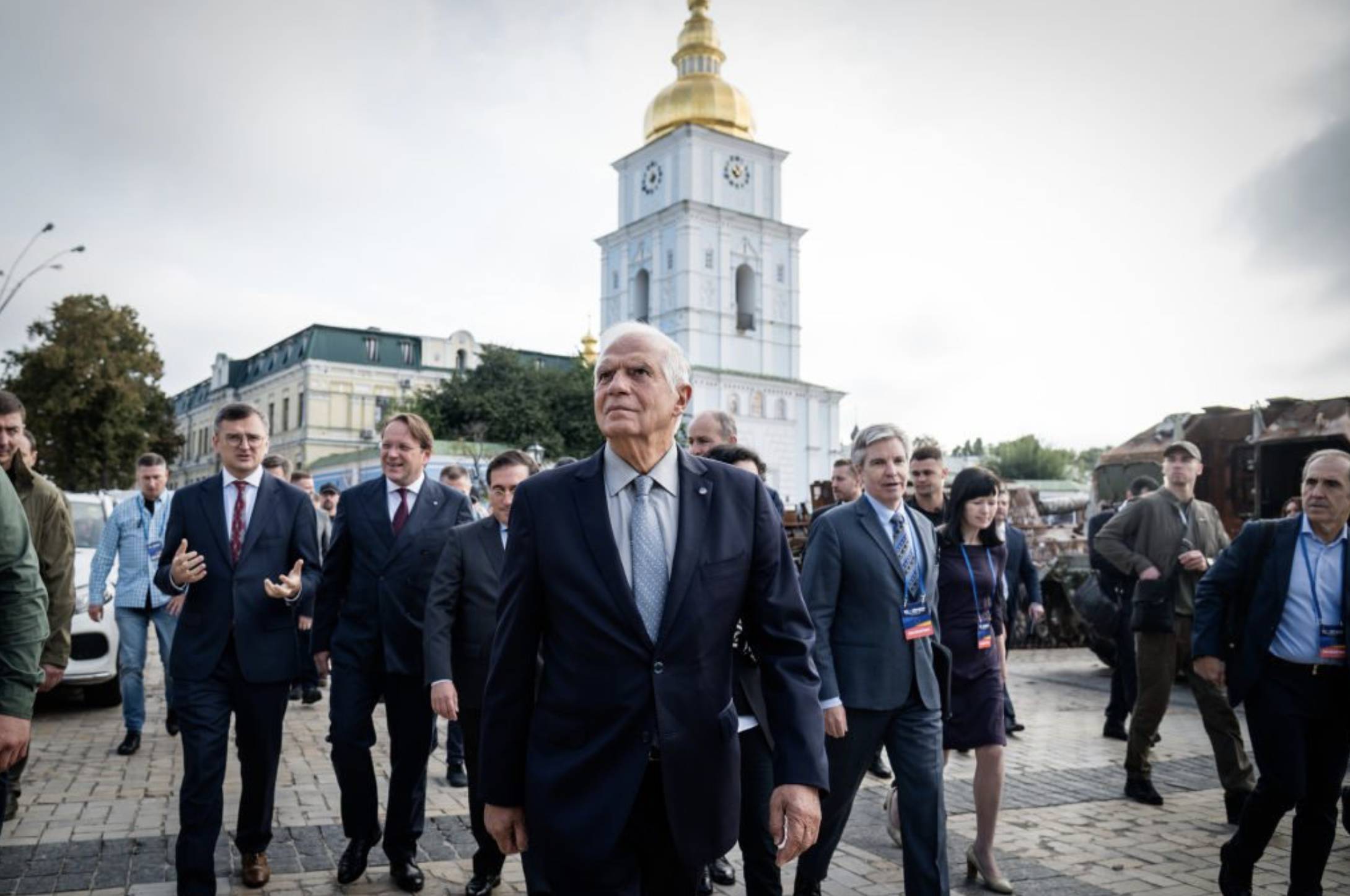
High Representative of the European Union for Foreign Affairs and Security Policy Josep Borrell at an exhibition of destroyed Russian equipment at Mykhailivska Square on October 2, 2023 in Kyiv, Ukraine. Photo: Eduard Kryzhanivskyi / Global Images Ukraine via Getty Images
But eventually colonialism began to seem relevant to Eastern Europe again albeit in two contrary ways. In one part of the political field, the critique of colonialism was revised to become compatible with the pro-Western consensus. Instead of recognizing and coming to terms with the Western colonial legacy, the critique of colonialism was revived as a means of condemning the East. We, the peoples of so-called Eastern Europe, have been victims of Russian and Soviet colonialism, and fighting colonialism could now mean fighting a backward Eastern power, instead of fighting the traditional powers of the West. In other political quarters, meanwhile, the rhetoric of anti-colonialism became useful for condemning the rising power of the West and, more importantly, for decrying almost anything that could be vaguely passed off as Western, thus strengthening local autocracies so as not to become Western colonies.
These competing claims point to real and serious imbalances in global power. They also show how loosely the term “colonial” has been thrown around, how easily it can be emptied of analytic content and critical value. For every careful analysis of Western and Eastern colonial practices in Eastern Europe (e.g. Platt, 2013; Švihlíková, 2015; Snyder, 2015; Balugun, 2022), there are hundreds of simplistic and distorting declarations by figures like Orbán or Putin who bandy about the “colonial” epithet to silence opponents and cloak their own policies in dubious patriotic morality (see Snochowska-Gonzalez, 2012; Melito, 2022). The revival of nearsighted anti-colonial discourse in the region has had the effect of occluding the global dimension of coloniality, reinforcing the idea that colonialism concerns Eastern Europe only insofar as its own inhabitants can be portrayed as victims. Minority voices have called for the region to join in a global challenge to colonial legacies everywhere (e.g. Ishchenko, 2022), but these voices struggle to be heard.
Specifying the Colonial
Eastern Europe experiences a paradoxical tendency to deny its specificity, insisting that it is a full part of the West, while simultaneously expressing an egotism with regard to the troubles of the rest of the world. Can it begin (again) to insert local struggles for equality and self-determination into global struggles? A first step in this direction would be to clarify the nature of international and intercultural domination in Eastern Europe, to show that local struggles are neither unique nor identical to struggles elsewhere, but engage at specific points in global structures. And in order to accomplish this, it would help to clarify the relationship between colonialism (whose impact on Eastern Europe is complicated and often indirect) and imperialism (which has played a dominant role in shaping Eastern European political and cultural systems for centuries).
These two phenomena, the colonial and the imperial, are intertwined in East European history, but this does not make them the same. They are entwined everywhere, and everywhere in different ways. Yet take, for example, Timothy Snyder’s characterization of what he considers to be a process of decolonization in the Balkans:
Balkan revolutions against Ottoman rule, usually categorized as national, were the beginning of the decolonial moment. The version of nationalism they offered was, on a global scale, more significant than the more celebrated French model, because in the two centuries to follow, nationalism would generally be anti-imperial rather than antiroyal. (Snyder, 2015, 696, my emphasis)
And then, moving a few decades forward he writes that during the course of World War I “all of the European land empires were either defeated or succumbed to revolution. This meant the completion of decolonization within Europe as of about 1922” (Snyder 2015, 696–7, my emphasis). This is the beginning of an otherwise articulate case for “insert[ing] eastern Europe into the history of colonialism” (Snyder, 2015, 696, ftnt. 4). But the elision of the colonial and the imperial is immediate; the first evidence offered of colonialism is the presence of empire[2].

Timothy Snyder. Photo: Wikimedia
Is there a problem? A definition is only as valid as it is useful, and people as diverse as Snyder and Putin clearly find it useful to define colonialism broadly. Is it really important to distinguish between the two logics of domination, both terrible and condemnable?
It’s important because the way we conceptualize our problem shapes the way we address it. In the 1970s and 1980s, the East European dissidents saw their countries’ domination as specific cases of imperial domination, detached from global dimensions of colonialism. From this perspective, it made sense to denounce the imperial power of the Soviet Union (or, in a typical elision, of “Russia”), while treating the plight of the Global South as a secondary concern. The dissidents’ relative lack of interest in colonialism paved the way, then, for the general East European public’s lack of interest in global post-coloniality in the 1990s. More recently, the imprecision of critique has gone in the other direction. When opponents of Russian imperialism denounce it as colonialism, they risk criticizing the wrong things, while leaving much of the underlying problem intact. Ukraine’s complex historical agency, its specific position in the enmeshed histories of surrounding empires, is reduced to a question of accepting or rejecting Russian influence, accepting or rejecting the chance to join the West. And as Volodymyr Ishchenko has argued (Ishchenko, 2022), a narrowly anti-colonial attitude often shifts critical focus to individual Russians and symbols of Russian culture, instead of offering a new vision of Ukrainian society and its place in universal emancipation.
Colonialism, to be clear, has played a role in Eastern European history, and that role has been wrongly overlooked in Western historiography. But in order to effectively insert Eastern Europe into global colonial history, we should specify the forms that colonialism has taken here. A few examples:
Consider, for example, the Teutonic Order, which in the thirteenth century conquered large Baltic territories, wiping out most of the indigenous population and setting up lucrative trading operations connecting Eastern resources to Western buyers. Long before the genocidal conquest of the New World, this colonization of Eastern Europe provided a model that could later be applied as European colonial projects spread. And Prussia, the largest successor to the Teutonic conquest, would eventually become the most powerful of German states, obtaining its own colonial possessions in the Global South.
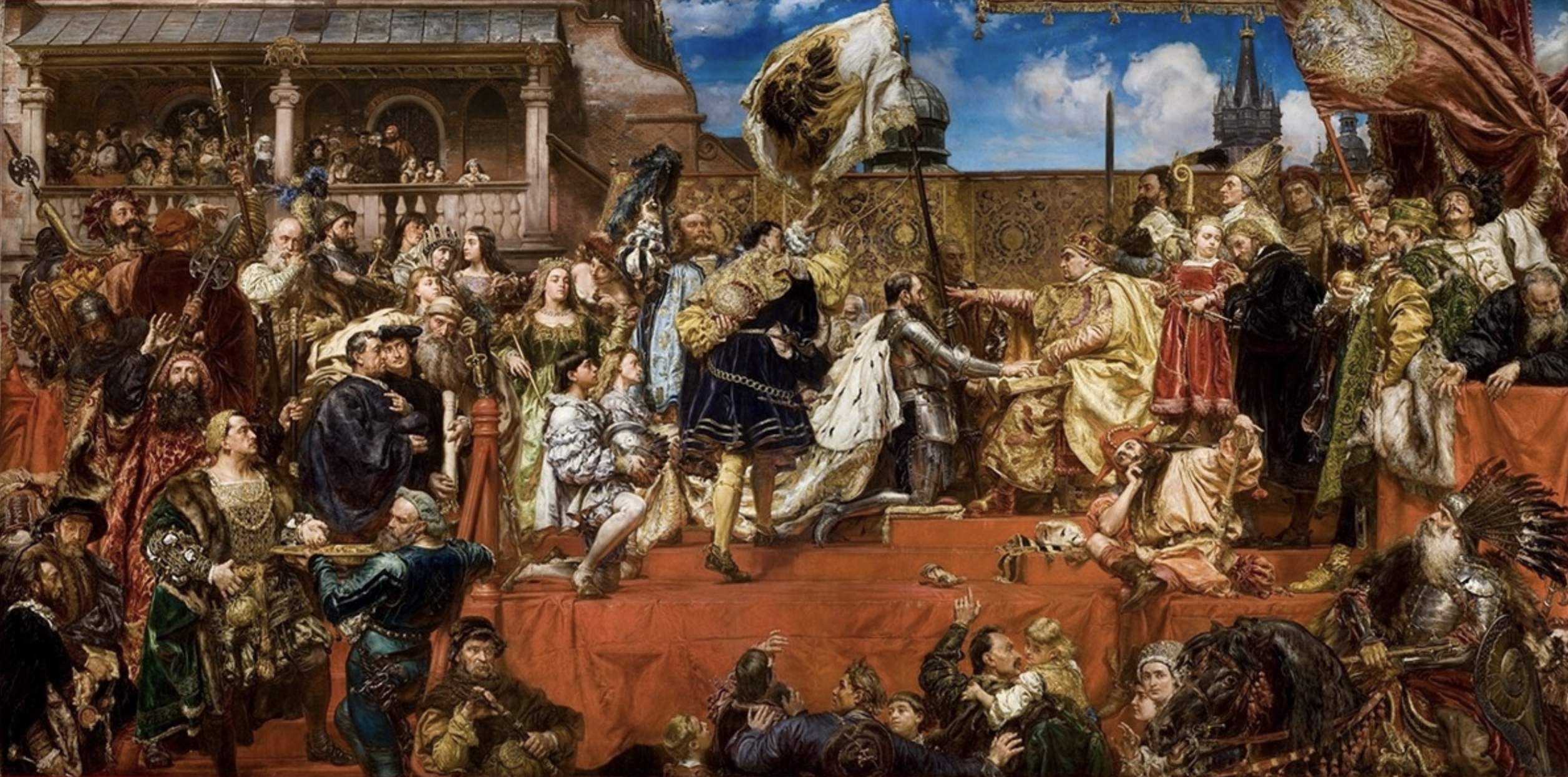
"Prussian tribute". Painting by Polish artist Jan Matejko
Consider also the short-lived attempts in the seventeenth century by Courland, another successor state to the Teutonic conquest and a vassal of Poland, to colonize Tobago and a part of the modern-day Gambia. Or consider the explorer Stefan Szolc-Rogoziński’s failed campaign in the nineteenth century to establish a Polish colony in Cameroon. Or consider Czechoslovak fantasies about colonizing Togo as the new country was being formed after World War I. The failure of these attempts shows how weak Eastern Europe was then on a global scale (Prussia having transformed from an Eastern colony into a Western power), but it also shows that the colonial imaginary was far from absent in these societies that would later rejoice at having never taken part in colonialism.
And consider, of course, Russia. The Russian conquest of Siberia and Central Asia between the sixteenth and the early twentieth centuries may be overlooked in colonial historiography, because it is clearly distinct from the classic cases of European metropoles establishing colonies overseas. But it has a great deal in common with the westward expansion of the United States, a new empire rapidly expanding into a vast hinterland. And apart from the lack of an ocean separating colonizer from colonized, the classic markers are there: an overpopulated colonial center not only extends political power over new territory, but also sends people to settle the lands, spreading the dominant culture while exploiting the regions’ resources. The colonizing power treats existing social and political structures largely as nonexistent or irrelevant and easily bypassed or suppressed, and it establishes a bifurcated social order, with one system that includes the full members of the colonizing polity (in this case mostly Russian settlers, but also with large numbers of Ukrainians and Germans), alongside a second, separate system that includes the indigenous population.
Another major site of unambiguous Russian colonial practice was southern Ukraine throughout the 18th century: in this case, the indigenous population had already been largely displaced in the centuries following the thirteenth-century Mongol destruction of Kievan Rus, which saw a long irregular war between Cossack and Crimean Tatar raiders. When Russia gained control of the territories, they were inhabited by Ukrainian Cossacks and peasants as well as Tatar traders, but the population was sparse. Russia encouraged merchants, laborers, and farmers to move in from the metropole, and it gave the region the most colonial of all possible names, “New Russia” (Novorossiya). There was, though, one important twist: many of the settler colonists were Ukrainians, whom the Russian state treated, for the most part, as regular imperial subjects – and, thus, as effective carriers of the colonization project – rather than treating them as an indigenous population to be eliminated or circumvented.
Genocide too, a historical hallmark of colonialism, has left its mark on Ukraine, first with the artificial famine of the 1930s (the Holodomor), later with the Nazi extermination of Jews and deliberate starvation of urban populations in occupied Soviet territories. In contrast to the 17th-century massacres of Poles and Jews by Cossack rebels led by Bohdan Khmelnytsky, which had more the character of spontaneous, misdirected anti-imperialism, Nazi policies bore distinctly colonialist features, with the priority they gave to resource extraction over human life, with their clear distinction between colonizing subjects and colonized non-subjects bereft of legal standing, and of course with their plans for settler-colonialism (Lebensraum).
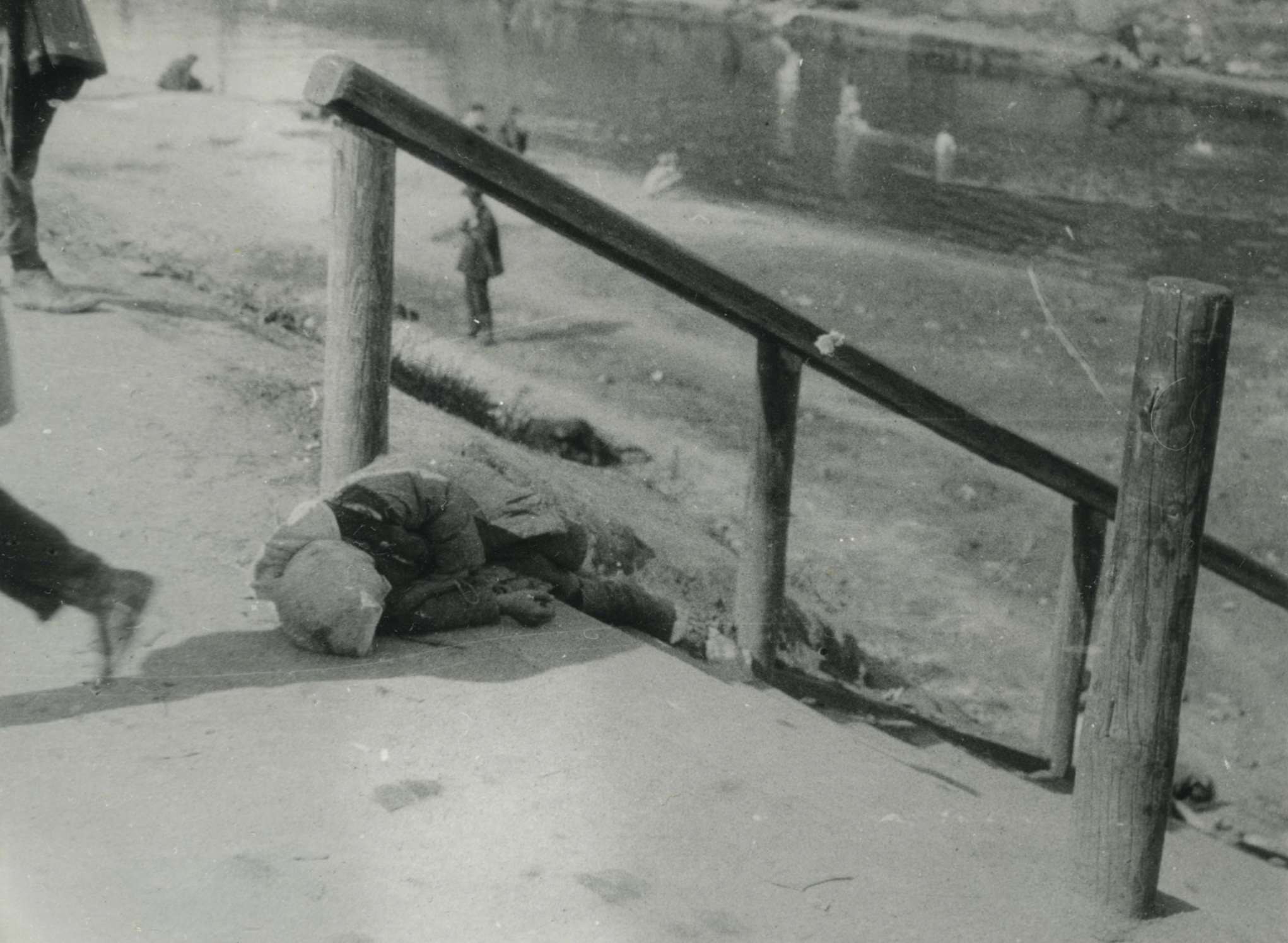
A dead child on Kharkiv Street, 1933. Photo: A. Wienerberger
The Holodomor too shares much with famines in Western colonies (like those Mike Davis refers to as “late Victorian holocausts”; Davis 2000). Whether or not these famines were all carried out with consciously genocidal aims is beside the point. The logic of colonialism treats indigenous populations as non-entities before treating them as enemies. If they seem bothersome to colonizers, the colonizers can turn them into enemies and deliberately exterminate them; if they appear extraneous, the colonizers can wipe them out simply by redirecting their food to more favored consumers.
But perhaps just as significant are several less obvious, sometimes indirect ties to the global colonial system. Snyder emphasizes, for example, that Russia created its extra-European empire at the same time as the Western powers were creating theirs; Russia emulated them and competed with them (Snyder, 2022). Poland-Lithuania, Austria-Hungary, and Germany also borrowed from the imaginaries and the strategies developed by Western colonial powers when they tried to turn their eastern agricultural hinterlands and spheres of influence into productive sources of commodities to be sold on the world market, in the interest of growing international power.
Identifying the Imperial
But in parallel to these developments, which show coloniality in Eastern Europe and insert East European history into global colonial history, there is another strand of historical development, more significant in East European context, best identified as imperial. Again, let’s look at a few historical examples:
In the fourteenth century, when Lithuania defeated the post-Mongolian Golden Horde for control of the central parts of the former Kievan Rus, instead of liquidating the old Kievan symbols and political structures, it adopted them, claiming to be Rus’s successor in the region. Lithuania, a newly powerful state, looked on the legacy of Rus as a prestigious mark of civilization, to be conquered and appropriated rather than replaced. This is not the logic of coloniality, but of imperiality.
When, after the sixteenth century, the Polish nobility gained growing control over these same territories within the Polish-Lithuanian Commonwealth, after already having taken direct control of the westernmost parts of former Rus, it did not engage in a campaign of rapid settlement and population displacement or intensive resource extraction. It put more effort into spreading its political and cultural structures, treating Lithuanian and Ruthenian (Rus) elites as Polish and treating cities like Lwów as Polish cities rather than as colonial outposts. This, again, is the logic of empire.
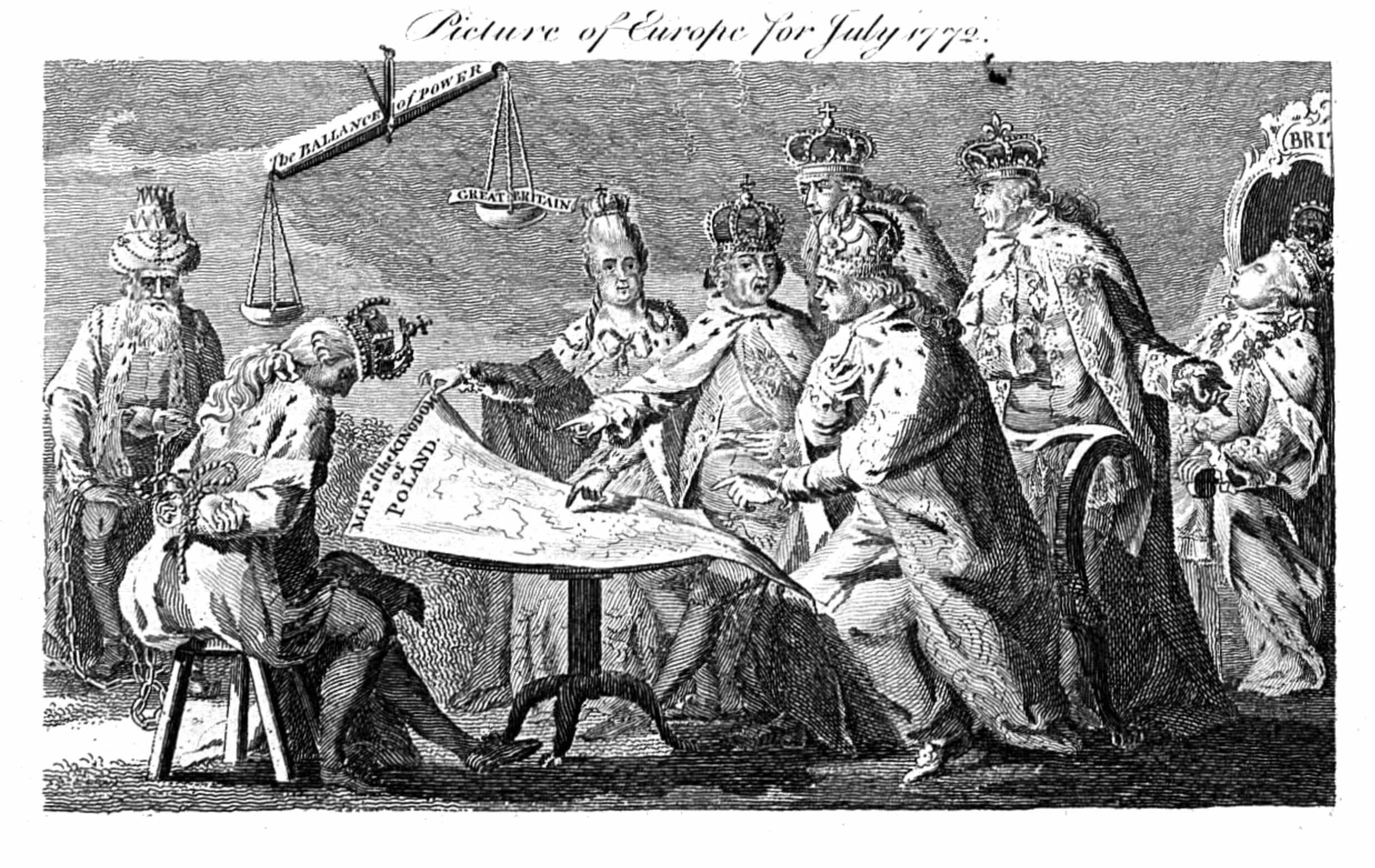
1772 English caricature of the First Partition of the Polish-Lithuanian Commonwealth / Catherine II (Russia), Frederick II (Prussia) and Joseph II (Austria) decide the fate of Poland. Polish King Stanislaus Augustus is tied up and other monarchs are removed from dealing with the issue
A century later, when the Russian state gained control over the eastern territories of old Rus, it did not ignore Rus’s heritage, but reclaimed it, declaring itself to be the old state’s legitimate heir and retroactively declaring Kiev to be its founding polity. Nor did Russia eliminate the local Ukrainian population, but instead treated Ukrainians as its own subjects. It denigrated modern Ukrainian culture, not by treating local heritage as unimportant, but by treating Russian culture as the sole prestige culture that laid claim to the heritage of Kiev. This is a strategy of imperialism, not of colonialism.
And then, when the newly powerful Russian Empire gained control over Livonia (today’s Latvia), Estonia, and later Lithuania, Poland, and Finland, it did not act the way the Teutonic Order had acted in the conquest of Prussia. Russia – aware that it was in possession of territories with strong governing institutions, relatively prosperous mercantile economies (at least in comparison with most of Russia), and prestige cultures (including Polish, German, and Swedish high culture, and Western Christianity) – did not ignore the existing sociocultural structures, but embarked on a strategy of integrating them, profiting from them, and competing with them. Again, this is an imperial, not a colonial approach to conquest.
When the Soviet Union declared itself to be anti-imperialist, it generally (though not entirely) avoided the tactics of colonialism, which unambiguously distinguish colonizers from colonized. Instead, its complex mix of imperialism and anti-imperialism spread the messy logic of imperiality, with its intricate hierarchy of institutions and cultures, its competing claims of inclusion and exclusion, and its crooked, forking lines between empire and imperialized.
Coloniality vs. Imperiality, a Provisional Characterization
Both coloniality and imperiality logics are present in Eastern Europe, and it would be wrong to oppose only one and ignore the other. But it’s important to disentangle them, to understand the distinct logics at play as we look for forms of resistance adequate to them – in the case of coloniality, a logic of domination through strict separation between the colonizers and the colonized, and in the case of imperiality a logic of domination through hierarchical integration.
The following is a brief attempt to characterize the distinction I have in mind. This schematic presentation, of course, should be refined in light of deeper historical analysis, and it should be held up for comparison to colonial and imperial situations throughout the world. But here I want to emphasize what I see as most consequential for Eastern Europe.
-
Coloniality and imperiality involve different kinds of states. As Todorova notes in arguing against Snyder, the Ottoman Empire was not a colonial power in the Balkans; colonialism presupposes a previously stable entity that subsequently embarks on a policy of colonization (Todorova, 2015, 711). Imperialism, more often, is a process of state formation, as newly formed empires reach out in multiple directions for the resources to construct their new dominions’ legitimacy.
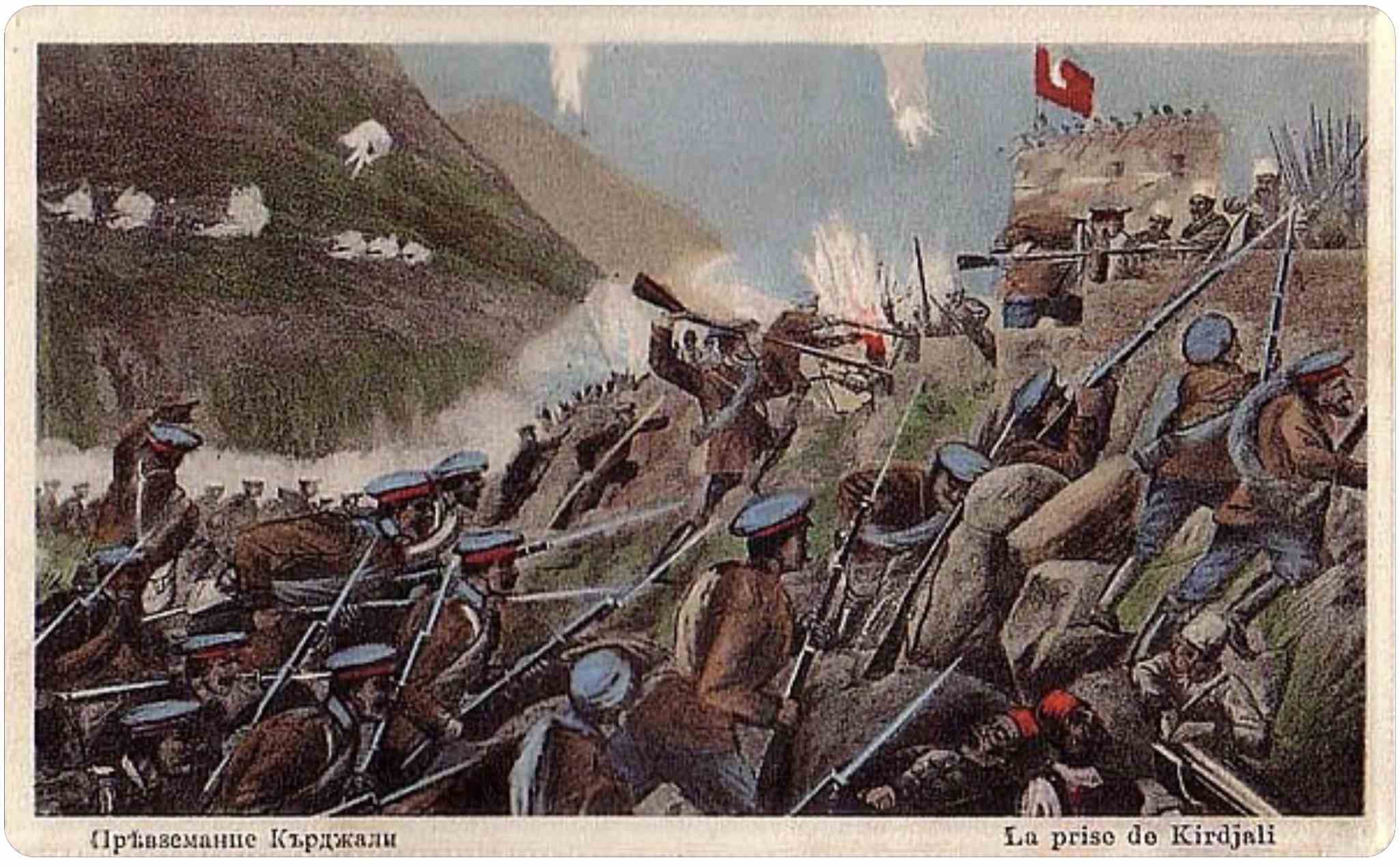
The Bulgarians capture Karjali from the Ottomans. Image: Wikimedia
-
Coloniality and imperiality involve different modes of governance. While the colonial state governs by clean separation (keeping subjects in differentiated categories with differing legal protections), the imperial state governs by integration, either erasing the difference among subjects or inserting them into a shared hierarchical system, with peoples separated by degrees, but not absolutely. Empires, to be clear, may be de facto heterogeneous. They never fully succeed in integration, and the continued process of imperialism brings diverse social and cultural forms into the empire, where the principle of governance is to integrate these differences into a single system and where political heterogeneity is typically a result of compromise (e.g. Poland-Lithuania, Austria-Hungary, Russian-controlled Finland), which the imperial power tries gradually to dissolve.
-
Colonial and imperial modes of governance implement different strategies of codifying difference. While coloniality establishes separate systems of governance to apply to the colonized and the colonizers, with the colony as an effectively subordinate state, imperiality integrates many categories of people into a single system of governance. Great Britain could still be a small European state even while running the world’s largest empire, because (apart, arguably, from Ireland) the colonies were not treated as a part of Britain itself. But even composite empires like Poland-Lithuania, Austria-Hungary, or Russia after taking Finland and central Poland still shared a single composite structure. Britain never wanted to make India a part of Britain; Russia was eager to abolish the autonomy it had first granted to Poland.
-
Coloniality and imperiality generate different types of subjects. Coloniality creates de-classified colonial subjects, who can be barely treated as subjects at all, barely recognized as humans, made into pure objects of colonial policy or purely extraneous factors to be excised from systems that find no useful means of exploiting them. Imperiality, by contrast, classifies its subjects and dominates populations by incorporating them into its system.
-
Coloniality and imperiality draw different kinds of borders. Coloniality clearly demarcates the boundary between the colonizers and the colonized, even while it continually crosses geographic frontiers, expanding into politically weak spaces; the most important borders of the colony are not territorial, but legal, borders between colonizing subjects and colonized objects. Imperiality, by contrast, creates shifting borderlands, where peoples mix as empires collide, as the capillary power of imperial centers intersects and as imperial subjects extend or twist or resist that power; there the crucial borders are territorial, while the legal boundaries between imperial subjects are continually transgressed as subjects struggle for position.
-
Coloniality and imperiality produce different economic structures. Colonial settlers and overlords exploit and extract local resources or indigenous populations, producing commodities immediately for a world market. Imperial subjects find their place in composite economic systems brought together by conquest, where old feudal systems may be protected in the interest of garnering noble support, local markets may be protected from global competition, national industries may be fomented in the interests of the imperial state and its competing supporters.
-
And finally, coloniality and imperiality provoke different forms of resistance. Because coloniality appears to the colonized as an alien force, anti-colonialism tends to focus on removing the alien element. As the colonial object turns into an anti-colonial subject, it emphasizes resistance to something absolutely separate from itself, something strictly external, while the internal features of the colonized society lie outside the scope of urgent criticism, its own problems unresolved. In a purely anti-colonial movement (not marked by anti-imperialism or anti-capitalist internationalism), whatever is not colonial can become valorized to the degree that it was devalued by the colonizers. This attitude is understandable and legitimate, but it may have the tragic consequence of postponing the process of self-transformation until after decolonization. It may leave unaddressed the internal differentiation of colonial subjects, ignoring their internal economic or cultural stratification, as the anti-colonial movement seeks unity against the colonizer. But imperiality, because it is never pure, compels anti-imperial movements – when they recognize their opponent as imperial – to ask themselves who they are.
This final claim calls for clarification. Not all movements identified as anti-colonial delay addressing internal problems of the colonized society while struggling against an absolutely separate, external power. Nor do all movements identified as anti-imperial take seriously the interweaving of external and interiorized domination that, I think, is fundamental to imperiality. What I mean to argue is that these differing forms of resistance are logical consequences of different ways of understanding domination. If the logics can be disentangled, we can better identify when an anti-colonial struggle might be most urgent, and when a distinct form of anti-imperial struggle is in order.
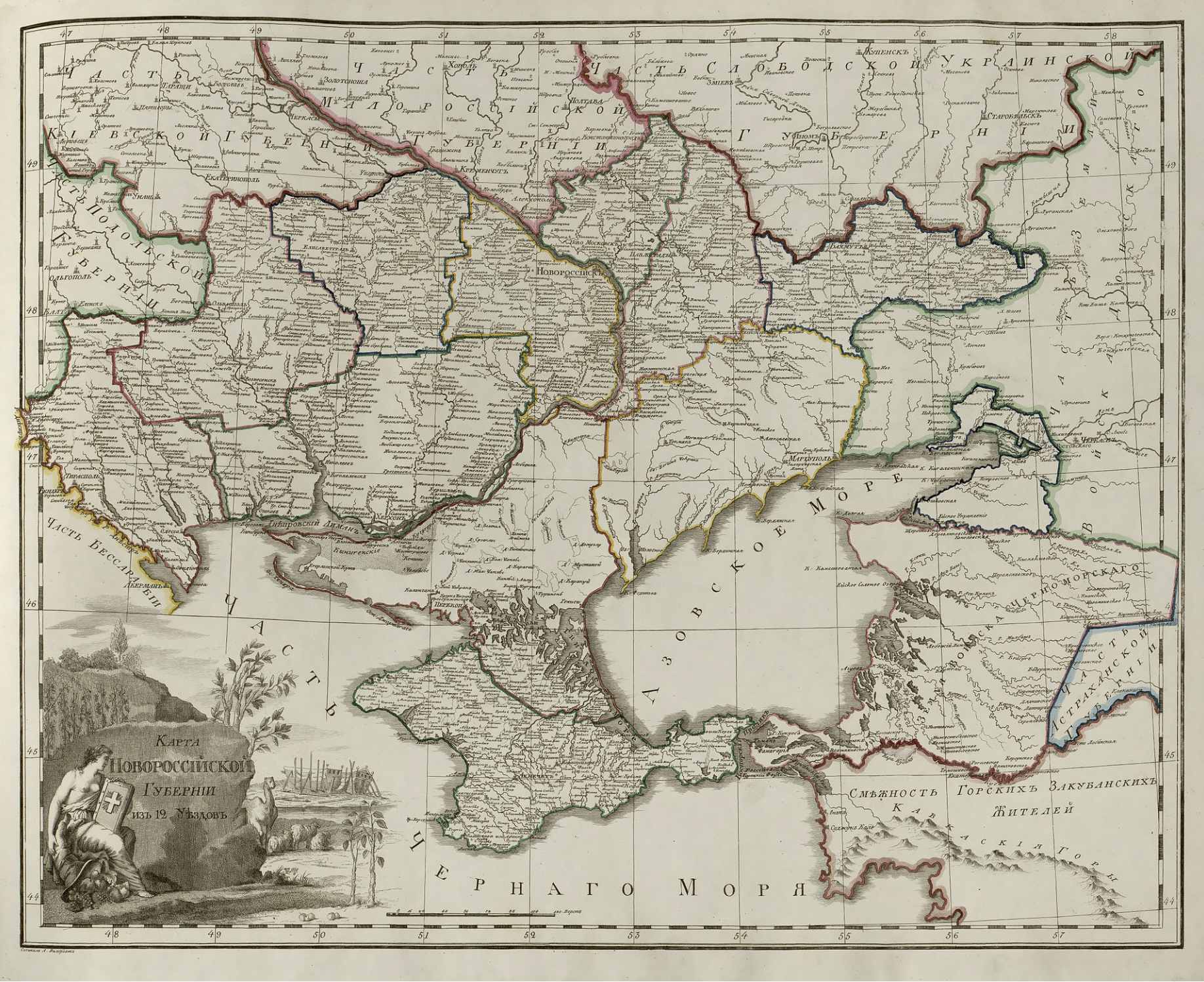
Atlas of the Russian Empire, 1800. Letter 38. Novorossiysk province with 12 counties. Photo: Wikimedia
An anti-imperial movement, if it recognizes the specifically imperial nature of what it’s up against, must address from the start the problem of its own heterogeneity. Conflicting classes, interlacing political systems, and competing cultural claims mingle within the subject that is calling for emancipation. Colonizing powers tend to homogenize the colonized under their control, but imperial powers integrate their subjects while differentiating among them, and anti-imperial movements are forced to work through that difference in the process of throwing off the empire.
The purely anti-colonial subject can be made to appear as a pure, precolonial subject, which thinks only about removing the colonizer. The anti-imperial subject can never be pure, because the empire governs through mixing and integration rather than by separation and excision. The anti-imperial subject is mixed, integrated, and has to find its way through this morass.
One of the great tragedies of the historic national liberation movements in Eastern Europe is that they typically began with an understanding of their messy status as imperial subjects, seeking transnational modes of liberation, but they proceeded to transform themselves into something more like anti-colonial movements, positing their own national purity and identifying the empire as a purely external force. (Snyder called this, in the passage quoted above, the “Balkan” model of nationalism, but it is not specifically Balkan, and only refers to one moment in the region’s historical movements.) In this process, the movements had a lot of help from Western colonial powers, who hardly understood the Eastern empires, but were happy to project the attitudes of their own colonized peoples onto the subjects of other empires.
Insofar as Ukrainians are fighting Russian colonialism, it is logical to identify Russians in Ukraine as colonizers and Russian culture as a foreign import. And it may be reasonable to help Russians in Ukraine shed the colonial features of their cultural life. But the anti-colonial struggle, if it is purely anti-colonial, can seek to purify its own subject by declaring all things Russian to be tools of an internal enemy to be expunged.
Insofar as Ukrainians are fighting Russian imperialism, the imperative shifts. Russians in Ukraine, as well as the many Russian-speakers who don’t consider themselves to be Russians, appear as fellow subjects of the same system of hierarchical classification, and they can all fight this system together. They can fight not only the external colonizer, but also the empire that is a part of their shared social system. And the target of struggle is not only in the colony, but wherever the empire is and wherever it needs to be overcome.
A successful anti-colonial movement liberates the periphery from the core, and that’s no small task. But a successful anti-imperial movement should liberate the periphery by liberating the center from itself. That can be something truly monumental.
References
Balogun, B. (2022). Eastern Europe: The “other” geographies in the colonial global economy. Area, 54(3), 460–467.
Davis, M. (2000). Late Victorian Holocausts. Verso.
Ishchenko, V. (2022, November/December). Ukrainian Voices?. New Left Review. Volodymyr Ishchenko, Ukrainian Voices?, NLR 138, November–December 2022 (newleftreview.org).
Melito, F. (2022). Anti-colonial neo-traditionalism in Central-Eastern Europe: A theoretical examination. New Perspectives, 30(4), 349–366.
Platt, K. (2013). Occupation versus colonization: Post-Soviet Latvia and the provincialization of Europe. In Blacker, U., Etkind, A., & Fedor, J. (Eds.), Memory and Theory in Eastern Europe (125-145). Palgrave Macmillan.
Snochowska-Gonzalez, C. (2012). Post-colonial Poland – on an unavoidable misuse. East European Politics and Societies, 26(4), 708–723.
Snyder, T. (2015). Integration and disintegration: Europe, Ukraine, and the World. Slavic Review, 74(4), 695–707.
Snyder, T. (2022, December 7). The making of modern Ukraine. Youtube. https://www.youtube.com/playlist?list=PLh9mgdi4rNewfxO7LhBoz_1Mx1MaO6sw_ (Accessed: 12 October 2023).
Švihlíková, I. (2015). Jak jsme se stali kolonií [How we become a colony]. Rybka.
Todorova, M. (2015). On Public Intellectuals and Their Conceptual Frameworks. Slavic Review, 74(4), 708–714.
Footnotes
- ^ And by “Eastern Europe” I mean a broad region located historically in a zone of intense competition and conflict between Western and Eastern imperial powers, especially as they coalesced during the Cold War and its aftermath. This means that I include the Balkans as well as the region often called “Central Europe,” and I am ready to face the anger of all who feel offended by finding themselves in this East European company. Without questioning the vast heterogeneity within the region, I am concerned here with what specificities are shared in the region as a whole.
- ^ Todorova already noted this intermingling of the colonial and the imperial in her response to Snyder’s article in the same issue of Slavic Review (Todorova, 2015, 710). But Snyder has persisted, maintaining the same terminological slippage, for example, in his popular series of lectures on Ukrainian history (Snyder, 2022).
Author: Joseph Grim Feinberg
First published: dversia.net
French translation: Réseau Bastille
Cover: Kateryna Gritseva



